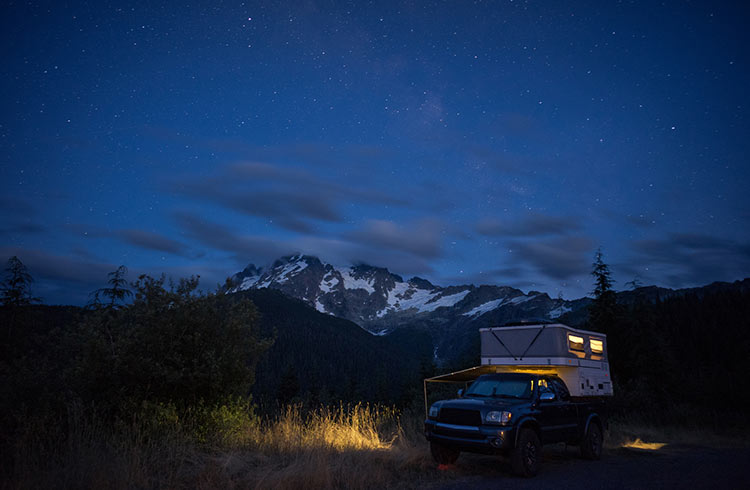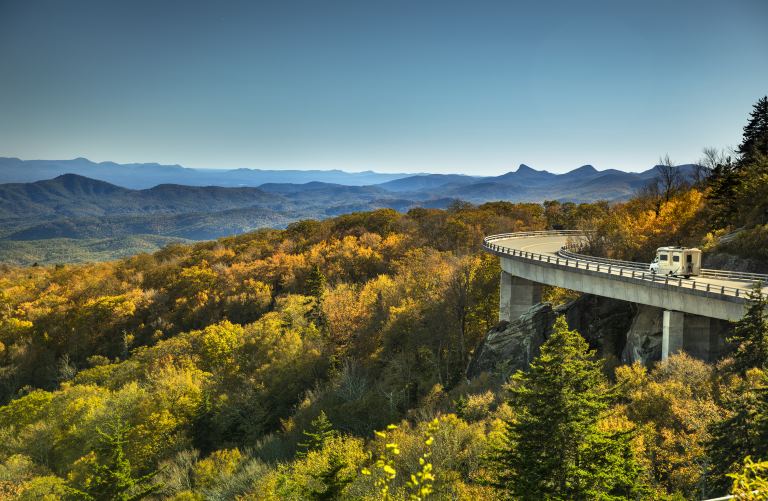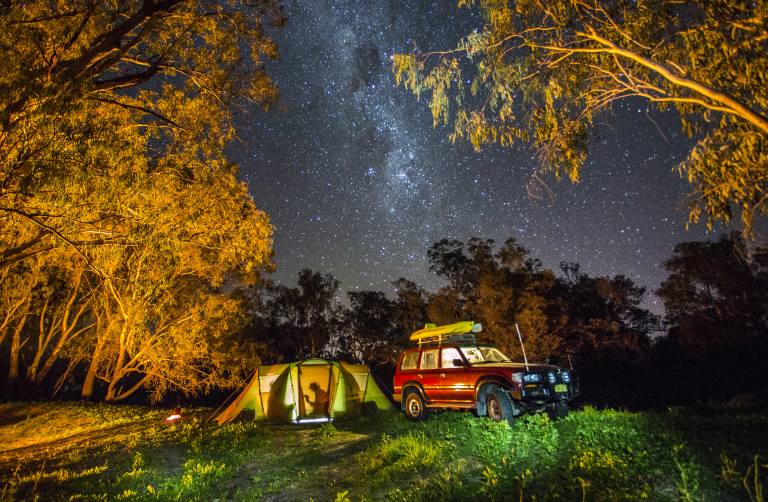USA Road Trip Tips: Safety Advice You Need To Know
Before you get your motor running to head out on the highway, here are some road trip tips to get you through whatever comes your way in the USA.
 Photo © Getty Images/Nick Ocean Photography
Photo © Getty Images/Nick Ocean Photography
First, check your hire car thoroughly before you take to the open roads in the United States.
Check the tires, wiper blades, defroster, fluids, and the belt and hose connections. Make sure your spare tire is in good shape, too.
Then gear up with water (for both you and your radiator), snacks, a blanket, travel pillow, first-aid kit, flashlight, the tools (and know-how) you need to repair a flat tire, safety reflector or flares, and an extra quart of oil.
Bring along a map (yes, an actual paper map) and keep a spare key in your pocket, separate from the rest of your other keys.
- The most dangerous highways in the USA
- Traffic laws by state
- Where can I park my RV?
- Tips for driving in the mountains
- Tips for driving in wet conditions
- Tips for driving in the desert
- Getting pulled over: What not to do
- How to avoid a road rage incident
The most dangerous highways in the USA
While a fender bender in the city can be a bummer, a high-speed accident on the interstate can be fatal. Using data from the National Highway Traffic Safety Administration, ValuePenguin ranked the US highways with the highest number of fatal crashes. Traffic volumes and higher speed limits on some highways helped contribute to these fatalities. Also a factor is the time it takes for help to reach a remote location.
ValuePengin's Top 10 Most Dangerous Highways in the U.S:
- US-93, Arizona
- SR-9, Oklahoma
- US-160, Colorado
- I-5, California
- I-10, Texas
- I-20, Texas
- I-80, Iowa
- I-10, Florida
- I-95, Florida
- I-10, Mississippi
There are more than 34,000 traffic deaths every year in this country, roughly the same as the amount of Americans killed annually by gun violence. Drunk driving is a factor in around a third of those car accidents, so it goes without saying, don’t drink and drive. You’ll find zero tolerance for it everywhere and stiff penalties if you’re busted.
A few other statistics to keep in mind: According to the National Safety Council, texting while driving raises the likelihood of an accident eight times, and crashes involving texting or talking on a cell phone – both hands free and hand held – make up nearly 30% of all accidents.
How safe is it to drive across America during the COVID-19 pandemic? Find out here.
Traffic laws by state
Did you know New Hampshire is the only state in the union that doesn’t require adults to wear a seatbelt? Seeing as how seatbelts can improve your odds of surviving a fatal crash by 45% (according to the National Highway Traffic Safety Administration), it seems folks in the Granite State really take their state motto of “Live Free or Die” seriously.
States also differ on helmets for motorcyclists, cell phone usage, and on smoking cigarettes in a car with minors, among numerous other things. Luckily the AAA has this handy guide on traffic laws by state.
So just know that when you’re on your road trip, you can blow smoke rings in your kid’s face in Texas, but don’t do it in Louisiana.
Where can I park my RV?
If you’re making the highway your home in an RV or van, campgrounds are your best bet. Truck stops are another alternative, but you may want to pack along some earplugs and a sleep mask; it’s also considered proper etiquette to buy something or have a meal there. Rest areas aren’t intended for overnight stays but can do the trick if you just need a few quick Zs; because of their often-isolated locations and poor lighting, though, they can sometimes be unsafe. Your ace in the hole just might be a Walmart – most of them will allow RVs to park overnight in the parking lot. Just check in with the manager first, and again, it’s polite to make some kind of purchase.
Tips for driving in the mountains
- Don’t ride your brakes when going downhill; shift into a lower gear even in a car with automatic transmission. Use lower gears to head up steep grades, too
- Don’t hug the centerline of the road
- Keep your gas tank filled – gas stations may be few and far between
- If there are more than three cars behind you, pull over when it’s safe and allow them to pass
- In winter (which can last well into spring) be sure to carry antifreeze, snow chains, an ice scraper, and a small shovel.
Traveling to the USA soon? Get a travel insurance quote.
Tips for driving in wet conditions
- Slow down; posted speed limits are intended for ideal conditions
- Don’t drive through standing water – there’s no telling how deep it is
- If your car hydroplanes, don’t use the brakes or turn the wheel. Just take your foot off the gas and keep looking and steering in the direction you want to go
- In fog, don’t use your high beams
- Avoid sudden stops in fog. If you do stop to wait out the weather, pull as far off the road as possible.
Tips for driving in the desert
- Let someone know what route you’re taking
- Avoid driving in the afternoon when temperatures peak
- Keep yourself hydrated
- If your engine begins to overheat, pull over or roll down your windows and blast the heater
- In the event of a breakdown, stay with your car unless you know exactly where the next oasis is. Keep the hood raised so people know you need help; it can also provide some shade.
Getting pulled over: What to do (and what not to do)
The black and white cruiser is flashing blue and red in your rearview mirror. A queasy feeling that falls somewhere between an invasive medical exam and an IRS audit washes over you. You’re getting pulled over – what should you do? First, stay cool. Try not to panic and this info, provided by the American Civil Liberties Union, will get you through it … although we can’t promise you won’t get that speeding ticket.
- Turn off the engine
- Keep your hands visible – don’t reach into the glove box or under the seat
- Stay calm and be polite
- You have the right to remain silent. You DO need to give your name (and some states require more info, such as your address), as well as provide your license, registration and proof of insurance, but beyond that you DON’T have to say anything. “Sorry, officer, I’d prefer not to answer that question.” Really, you can say that
- You DON’T have to allow a search of your car or yourself. If there’s probable cause or you’re under arrest, the cops won’t need consent to search you (and sometimes your car)
- If you are arrested, ask for a lawyer immediately
- If you are stopped but not arrested, ask if you are free to go. If the answer is yes, calmly go on your way.
And if you feel like you’ve been treated badly, don’t argue it out on the roadside. You won’t win. Take down the officer’s name and badge number then make a complaint afterward.
How to avoid a road rage incident
According to the AAA, aggressive driving – as in tailgating and erratic lane-changing – is a factor in up to 56% of all fatal car accidents. Combine that with a Harvard School of Public Health study that found motorists with guns are more likely to act aggressively, and you have a potentially lethal combination. The AAA studied 10,000 road rage cases over a seven-year period, tallying more than 200 murders and 12,000 injuries.
So how can you avoid a road rage incident? Here’s what the AAA recommends.
Don’t offend anyone
Seems pretty basic, but just don’t cut anyone off (check your blind spot before changing lanes); don’t drive slowly in the left lane (that lane is for passing or faster traffic); don’t tailgate (you’ll be at fault for any accident); don’t make rude gestures (no matter how well deserved).
Don’t engage
Give angry drivers plenty of space and avoid eye contact. If you need help, call the police or drive to a populated location like a shopping center or hospital. Remain in your car and honk the horn to get attention.
Adjust your attitude
Give yourself plenty of time to get where you’re going, and perhaps switch up your drive tunes from fast and furious to a slow jam. Do a little deep breathing and try not to take another driver’s actions personally. There could be any number of reasons why they’re driving like a doofus.
Related articles
Simple and flexible travel insurance
You can buy at home or while traveling, and claim online from anywhere in the world. With 150+ adventure activities covered and 24/7 emergency assistance.
Get a quote

2 Comments
Avoid getting gasoline late at night, even after dark. Fill up the car in the day.
Don't go into bad urban areas. These areas look bad - run down and dirty. Just get out if you find yourself in such a place.
Other than that the USA is very safe, regardless of what is portrayed in the media.
Just wondering if you guys cover motorcycles over 200cc, am doing a motorcycle trip Harley Davidson in the USA